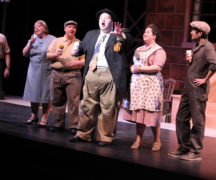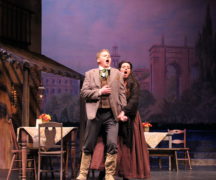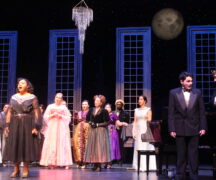By DAVID DUPONT
BG Independent News
Comedy is timeless.
The BGSU Opera Theater’s double-bill of “How to Reform a Drunk” by Christoph Willibald Von Gluck from 1760 and “The Four Note Opera” by Tom Johnson from 1972 are as different in their approaches as you’d expect from works written 200 years apart. The reactions they provoke are the same – knowing chuckles and hearty guffaws.
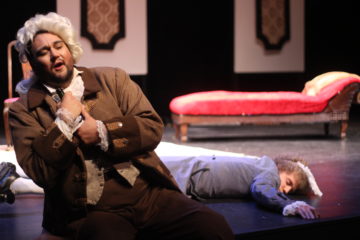
Aaron Meece, front left, with Tyler Strayer in “How to Reform a Drunk.”
The operas will be performed tonight (Nov. 3) at 8 p.m. and Sunday (Nov. 5) at 3 p.m. in Kobacker Hall on the Bowling Green State University campus. Tickets are $20 at the door, and cheaper if purchased in advance by calling 419-372-8171 or online. https://www.bgsu.edu/the-arts.htmlfrom
The Gluck is a classic comic send-up. A vintner Lukas (Tyler Strayer) conspires to get the drunken father Zipperlein (Aaron Meece) to let him marry his daughter Marie (Hannah Stroh).
She, however, is in love with the actor Anton (Aaron Hill).
Her mother (Eunice Ayodele), the victim of her husband’s drunken behavior, is caught betwixt. As much as Katharine despises Lukas, “actors,” as she tells her daughter, “are the worst.”
Still Anton gets into her good graces by concocting a plan to reform Zipperlein. That leads to a wonderfully fantastic scene with the husband believing he and Lucas have died and gone to hell where they will face punishment for their drunkenness.
Before then they get to sing robustly of the joys of wine.
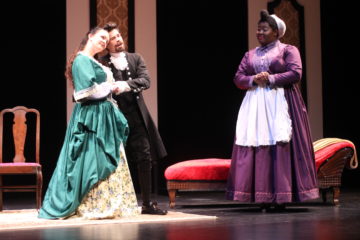
From left Hannah Stroth, Aaron Hill,and Eunice Ayodele.
The English translation and adaptation from the French by Ellen Scholl, of the BGSU faculty, presents the plot in a clear and wonderful way. And director Geoff Stephenson makes sure the show has a crisp pace leading to happy resolution. We know these characters from watching musicals and situation comedies. Hearing them give voice to their dilemmas and hopes in light, floating music is a treat. The stage orchestra, conducted by music director Emily Freeman Brown, buttresses the singers and paints the scene, including the comic hell.
The characters, such as they are, in Johnson’s opera find themselves trapped in another kind of hell – an opera without a plot and only four notes. What is lacking in those departments is made up for by the cast of characters with an overabundance of ego.
These are operatic archetypes, and some of the slightest gestures, or even costume changes will have opera aficionados hooting. But Stephenson and the singers make sure the comedy is broad enough to entertain the uninitiated as well.
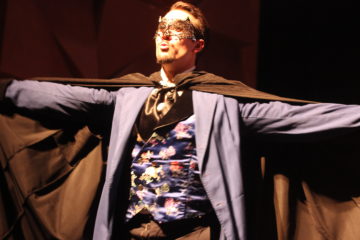
Luke Serrano in “Four Note Opera”
The script allows the director broad discretion in the production, as long as it is funny and absurd.
The cast consists for five singers representing five voice types from bass (Tom Krueger) who certainly leaves his mark in his brief appearance to soprano (Alicia Berryhill).
First up is the contralto (Hayley Hoss), and she’s very reluctant to share the stage with the soprano for their duet, shoving her aside until she tumbles off.
The tenor (Luke Schmidt) also has his issues beyond having to wear a clown nose. He only got one aria, he says, and others get more, and then during a quartet he has to sing draped over a chest.
Baritone (Luke Serrano) gets the best entrance, dashing onto the stage, bare chested, wielding a knife. But don’t expect the words, even as crisply enunciated as they are, to explicate why he’s bare chested and wielding a knife. He’s baritone. He gets to do stuff like that.
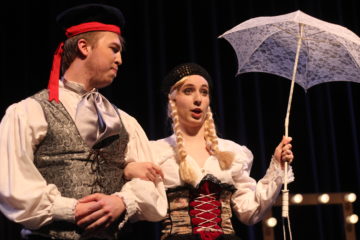
Luke Schmidt and Alicia Berryhill in “Four Note opera”
And the soprano gets to sing the same aria twice, once slowly to show off her beautiful tone and musicality, and the second time faster, to show her virtuosity.
The insistent melodies, all made up of four notes as advertised, add a comic undertow. The melodic limits only contribute to the sense of the singers being trapped.
Avery Erwin as the dresser is busy throughout, pulling props, wigs and costumes out of a chest, evoking an operatic variety show. You really could play opera bingo, marking off the classics referenced.
Then there’s the accompanist. Pianist Kevin Bylsma, who works with the Toledo Opera as well as being on the BGSU faculty, is typecast to be sure. He’s not only on stage but set in the middle with the action. He remains professionally blasé as the singers and antics swirl in front of him. He’s there, doing his job, just don’t bother him with the dramatics.
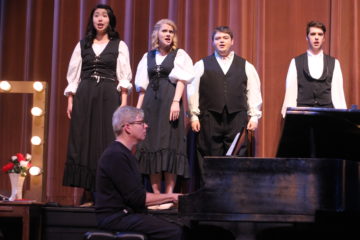
Kevin Bylsma and the chorus
At one point, he even leafs through a magazine because his services are not needed. He’s free because the contralto has an unaccompanied solo. At first she sings about how she likes the freedom because she can extend notes, insert pauses, even change text, and nobody notices. Well, the composer will, and the director and … But the problem, Hoss sings, is she must land solidly on an “A” with the piano joining her for the final note. Everyone will know if she’s off. So her solo devolves into her angst over whether she really is on pitch.
The entire cast, including the chorus, deliver this existential comedy with a sure lightness, that’s a delight. It’s hard to imagine a funnier night at the opera.


